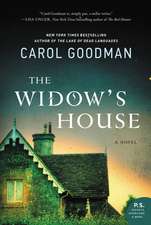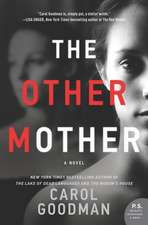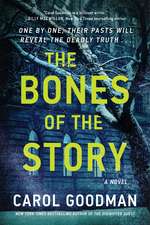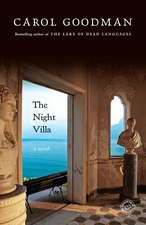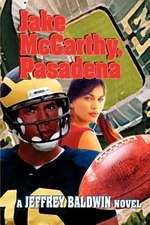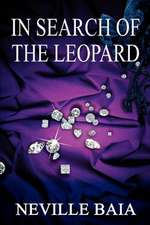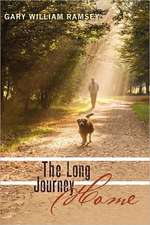The Seduction of Water: Ballantine Reader's Circle
Autor Carol Goodmanen Limba Engleză Paperback – 30 noi 2003
Din seria Ballantine Reader's Circle
-
 Preț: 97.74 lei
Preț: 97.74 lei -
 Preț: 120.15 lei
Preț: 120.15 lei -
 Preț: 107.27 lei
Preț: 107.27 lei -
 Preț: 126.98 lei
Preț: 126.98 lei -
 Preț: 113.15 lei
Preț: 113.15 lei -
 Preț: 115.32 lei
Preț: 115.32 lei -
 Preț: 109.33 lei
Preț: 109.33 lei -
 Preț: 99.83 lei
Preț: 99.83 lei -
 Preț: 129.37 lei
Preț: 129.37 lei -
 Preț: 114.71 lei
Preț: 114.71 lei -
 Preț: 65.81 lei
Preț: 65.81 lei -
 Preț: 116.57 lei
Preț: 116.57 lei -
 Preț: 91.96 lei
Preț: 91.96 lei -
 Preț: 90.35 lei
Preț: 90.35 lei -
 Preț: 120.71 lei
Preț: 120.71 lei -
 Preț: 116.64 lei
Preț: 116.64 lei -
 Preț: 139.70 lei
Preț: 139.70 lei -
 Preț: 110.76 lei
Preț: 110.76 lei -
 Preț: 127.70 lei
Preț: 127.70 lei -
 Preț: 116.55 lei
Preț: 116.55 lei -
 Preț: 112.52 lei
Preț: 112.52 lei -
 Preț: 109.71 lei
Preț: 109.71 lei -
 Preț: 111.51 lei
Preț: 111.51 lei -
 Preț: 111.17 lei
Preț: 111.17 lei -
 Preț: 121.22 lei
Preț: 121.22 lei -
 Preț: 89.48 lei
Preț: 89.48 lei -
 Preț: 106.23 lei
Preț: 106.23 lei -
 Preț: 123.90 lei
Preț: 123.90 lei -
 Preț: 118.73 lei
Preț: 118.73 lei -
 Preț: 126.88 lei
Preț: 126.88 lei -
 Preț: 112.64 lei
Preț: 112.64 lei -
 Preț: 110.96 lei
Preț: 110.96 lei -
 Preț: 128.86 lei
Preț: 128.86 lei -
 Preț: 124.72 lei
Preț: 124.72 lei -
 Preț: 128.86 lei
Preț: 128.86 lei -
 Preț: 122.76 lei
Preț: 122.76 lei -
 Preț: 122.64 lei
Preț: 122.64 lei -
 Preț: 133.06 lei
Preț: 133.06 lei -
 Preț: 132.06 lei
Preț: 132.06 lei -
 Preț: 109.73 lei
Preț: 109.73 lei -
 Preț: 93.82 lei
Preț: 93.82 lei -
 Preț: 101.06 lei
Preț: 101.06 lei -
 Preț: 85.08 lei
Preț: 85.08 lei -
 Preț: 85.13 lei
Preț: 85.13 lei -
 Preț: 79.16 lei
Preț: 79.16 lei -
 Preț: 88.39 lei
Preț: 88.39 lei -
 Preț: 99.83 lei
Preț: 99.83 lei -
 Preț: 92.83 lei
Preț: 92.83 lei -
 Preț: 87.43 lei
Preț: 87.43 lei
Preț: 121.12 lei
Nou
Puncte Express: 182
Preț estimativ în valută:
23.18€ • 24.20$ • 19.18£
23.18€ • 24.20$ • 19.18£
Carte disponibilă
Livrare economică 14-28 martie
Preluare comenzi: 021 569.72.76
Specificații
ISBN-13: 9780345450913
ISBN-10: 0345450914
Pagini: 400
Dimensiuni: 141 x 209 x 23 mm
Greutate: 0.33 kg
Editura: BALLANTINE BOOKS
Seria Ballantine Reader's Circle
ISBN-10: 0345450914
Pagini: 400
Dimensiuni: 141 x 209 x 23 mm
Greutate: 0.33 kg
Editura: BALLANTINE BOOKS
Seria Ballantine Reader's Circle
Extras
Chapter One
My favorite story when I was small, the one I begged for night after night, was “The Selkie.”
“That old story,” my mother would say. She’d say it in exactly the same tone of voice as when my father complimented her dress. Oh, this old thing, she’d say, her pale green eyes giving away her pleasure. “Wouldn’t you rather something new?” And she’d hold up a shiny book my aunt Sophie, my father’s sister, had bought for me. The Bobbsey Twins or, when I was older, Nancy Drew. American stories with an improving message and plucky, intrepid heroines.
“No, I want your story,” I would say. It was her story because she knew it by heart, had heard it from her mother, who had heard it from hers . . . a line of mothers and daughters that I imagined like the images I had seen when I stood by her side in front of the mirrors in the lobby.
“Well, if it will help you sleep . . .”
And I would nod, burrowing deeper into the blankets. It was one of the few requests I stuck to, perhaps because my mother’s initial hesitation came to be part of the ritual—part of the telling. A game we played because I knew she liked that I wanted her story, not some store-bought one. Even when she was dressed to go out and she had only come up to say a quick good night she would sit down on the edge of my bed and shrug her coat off her shoulders so that its black fur collar settled down around her waist and I would nestle into its dark, perfumed plush, and she, getting ready to tell her story, would touch the long strands of pearls at her neck, the beads making a soft clicking sound, and close her eyes. I imagined that she closed her eyes because the story was somewhere inside her, on an invisible scroll unfurling behind her eyelids from which she read night after night, every word the same as the night before.
“In a time before the rivers were drowned by the sea, in a land between the sun and the moon . . .”
Here she would open her eyes and touch the knobs of my headboard, which had been carved into the shapes of a crescent moon and a sun by Joseph, the hotel gardener, to replace its original broken knobs. We used the bedding and furniture too worn-out for guest use—blankets with hems coming unstitched, dressers with rattling drawers, and tables with ring marks where careless city ladies had put down hot teacups without a saucer. The rooms we lived in were leftovers themselves, the attic rooms where the maids lived before the new servants’ quarters were built in the North Wing. It’s where my mother had stayed when she’d come to the hotel to work as a maid. Even after she’d married my father, the hotel manager, she told him she liked being up high. From the attic rooms you had the best view of the river flowing south toward New York City and then to the sea.
“In this land, where our people came from, the fishermen told a story about a man who fell in love with one of the seal women, selkies the peo- ple called them, seals that once a year could shed their skin and become women . . .”
“So were they women pretending to be seals or seals pretending to be women?”
This interruption my mother would take in stride because I always asked the same question and she had incorporated the answer into the story.
“. . . and no one ever knew which they had been first, seal or woman, which is part of their mystery. When you looked into the seal’s eyes you could see the human being looking out, but when you heard the woman singing you could hear the sound of the sea in her voice.”
Still unsatisfied as to whether the selkies were mainly seal or human, I would indicate to my mother that I was ready for her to go on by burrowing deeper into the covers and closing my eyes. I knew my mother had someplace to be and the story could detain her only so long. If she didn’t think I was falling asleep, I risked losing the story altogether.
“. . . and so it happened that on that one day a farmer went down to the sea . . .”
“Did he go to collect seashells for his garden paths?” I would ask. “The way Joseph said they did in France.” Joseph had worked at all the finest hotels in Europe after the war. On his right forearm, just visible when he rolled up the cuffs of his faded blue workshirts, were faint numbers, the same color as the shirts he wore.
“Yes, a path of seashells sounds nice,” she would say, smiling. She liked it when I thought up new details for her stories. “He wanted the path to his house to glow in the moonlight like broken pearls. That’s what he was thinking about when he looked up and saw, sunning herself on a rock, a girl with skin like crushed pearls and hair as dark as coal.”
Black hair. Like my mother. Like me. Recently, I found my mother’s old book of Irish folktales that contained “The Selkie.” The selkie in it is blond. My mother must have decided to make the heroine of her story dark-haired like us.
“The dark-haired girl with pearl skin sang like something you might hear in a dream, sweeter than anything you’d hear in a theater or Carnegie Hall even . . .” Here, if I peeked, I’d see that my mother, her eyes still closed, wore the expression of someone listening to music. She’d be quiet for a moment and for once I wouldn’t fill the silence with a question because, I thought, if I listened carefully enough I would hear what she heard too. All I did hear, though, were the muffled footsteps and hushed whispers of the night maids and the groan of the old elevator taking late diners back up to their rooms. If there was singing it would be one of the retired music teachers who rented attic rooms for the summer. As soon as my mother opened her eyes I’d snap mine shut.
“. . . and so the farmer fell in love with the dark-haired girl and decided he wanted her for a wife, but when he tried to get closer to the rock where she sat, she heard him and dived into the water. The farmer stood on the shore watching for the girl, sure that she couldn’t stay in the water for long. Then he saw, out beyond the breakers, a sleek dark head appear. But she wasn’t a girl anymore, she was a—”
“Seal!” I would say, forgetting in my excitement to make my voice sound sleepy.
“Yes. The farmer stood for a long time looking at the ocean thinking over what he had seen, or what he thought he had seen, but at last he remembered he had cows to milk and chickens to feed and so he turned his back to the ocean and went on home.”
“But he couldn’t forget the dark-haired girl and her beautiful voice.”
“No. He couldn’t. Could you?”
My mother always asked me the same question, but no matter how many times she asked it, I was always unprepared. Not that I doubted that I too, like the farmer, would have been smitten by the dark-haired singer; but there was something in the way my mother asked the question that made me think I should answer differently, that I should have been able to resist the selkie’s song. After all, look what happened to that poor farmer . . .
He was so lovesick for the selkie girl that he was unable to sleep and the sound of the ocean, which he’d heard since the day he was born, began to grate on his nerves. It seemed there was always sand in his bed no matter how many times he’d shake out his sheets and even with all the windows open he’d feel as if he were suffocating inside his cottage.
(I could always hear, in this part of the story, an edge in my mother’s voice. When I was little I thought it had to do with the sand in the sheets. My mother had been a hotel maid, after all, and she would often tell me how rude it was when guests left cracker crumbs or worse in their beds. But later I guessed the edge in her voice had more to do with her own trouble sleeping.)
Things went on like this until the farmer began to neglect his fields. His cows went unmilked and his hens wandered into his neighbors’ yards looking for food. In desperation, he sought out the help of an old wise woman who lived in a cottage on a cliff above the sea. The minute she laid eyes on the farmer she knew by his shrunken pupils and the way his ribs stood out under his threadbare shirt like the hull of a staved-in boat, and how his hair was tangled like a mass of seaweed, what his problem was.
“How long has it been since you saw the selkie?” she asked him, sitting him down by the fire and giving him a cup of bitter-tasting tea.
“It’ll be a year tomorrow,” he told her, “to the day. I remember because it was the first day of spring.”
The old woman smiled. “As if you needed that to remember,” she scolded, but she didn’t tell him to forget the selkie. Instead she told him to finish his tea, which would make him sleep through the night. “Then tomorrow, go back to the rock where you saw her. You must swim out to the rock, being careful she doesn’t hear you. By her side you’ll see a rolled-up skin that you must snatch away from her. Once you have her skin she’ll have no choice but to follow you home.”
“And she’ll stay and be my wife?”
“She’ll stay and be your wife.”
“And bear my children?”
“She will bear your children.”
“And she might, one day, grow to love me?”
The old woman shrugged, but whether to say she didn’t know or that he asked too much, the farmer never knew. Already the tea was dragging his eyelids down and making his arms and legs heavy. He staggered from the old woman’s hut and only made it home because it was all downhill from where she lived to his front door. He didn’t even bother finding his bed but fell asleep on a rug in front of the fire.
When he awoke he saw by the angle of the light coming through the window that he’d nearly overslept the day—he felt as if he’d been asleep for a year—but then he heard above the roar of the ocean a voice singing. Her voice.
He ran toward the sea, remembering at the last minute to creep quietly down to the edge and slip into the water making as little noise as possible. Fortunately, the slap of the waves of the encroaching tide masked his clumsy thrashing in the water as he approached the rock. He saw the dark-haired girl and there beside her a bundle—her skin—sleek and shiny in the light of the setting sun, like a coal burning slowly from within. As soon as he laid his hand on the skin the dark-haired girl turned and gave him a look that froze his blood. Her eyes, fringed by coal-dark lashes, were the pale green of sea foam. He opened his mouth and swallowed so much seawater he would have sunk to the bottom of the ocean right then if he hadn’t clutched the skin to his chest. It acted like a life preserver; it was that buoyant. He turned and swam back to shore trying to forget the look the girl had given him. She’d change her mind about him, he thought, once she got used to him.
It was harder getting to shore than he’d figured. A sudden wind had risen that whipped the waves into a frenzy. Although the skin kept him afloat it also seemed to be pulling him out to sea. The current that wrapped around his legs seemed to have muscle to it, like a giant eel squeezing the life breath out of him. By the time he dragged himself out onto the sand, he was too weak to stand. He’d imagined himself holding the skin up before the girl like a proud conqueror, but instead he clutched the soft fur to his face like a baby mouthing his blanket for comfort. The skin still felt warm to the touch—as if it had absorbed the sun into its very fiber. When he looked up he saw the dark-haired girl sitting a few feet above him where the sand rose to a crest above the shoreline. Her knees were drawn up to her chest and her long hair fell around her legs like a curtain to hide her nakedness. Her sea-green eyes watched him impassively. Waiting to see if I’m drowned or not, he thought. When she saw that he wasn’t dead, she got up and walked away from the ocean toward his house. It was he, after all, who followed her home.
At this point in the story my mother would pause to see if I was asleep yet. I had to gauge my reaction carefully. If I seemed too awake she’d decide the story wasn’t working and tell me sternly to go to sleep. If she believed I was almost asleep she’d slip out without a word, turning the light off and closing the door behind her. Then I’d be left in the dark with the unfinished story churning in my brain, keeping me awake just as the selkie’s song had kept the farmer awake. It was that feeling you get when you put down an unfinished sandwich and you forget where you’ve put it; you keep hungering for that last bite. I would be alone in the dark, the sounds of the hotel slowly winding down like a music box playing out. I knew my mother shared that same horror of sleeplessness and if I asked, in just the right sleepy voice, for just a little more she would sigh and pull the fur-trimmed coat a little tighter around her arms, as if she were cold, and go on . . .
My favorite story when I was small, the one I begged for night after night, was “The Selkie.”
“That old story,” my mother would say. She’d say it in exactly the same tone of voice as when my father complimented her dress. Oh, this old thing, she’d say, her pale green eyes giving away her pleasure. “Wouldn’t you rather something new?” And she’d hold up a shiny book my aunt Sophie, my father’s sister, had bought for me. The Bobbsey Twins or, when I was older, Nancy Drew. American stories with an improving message and plucky, intrepid heroines.
“No, I want your story,” I would say. It was her story because she knew it by heart, had heard it from her mother, who had heard it from hers . . . a line of mothers and daughters that I imagined like the images I had seen when I stood by her side in front of the mirrors in the lobby.
“Well, if it will help you sleep . . .”
And I would nod, burrowing deeper into the blankets. It was one of the few requests I stuck to, perhaps because my mother’s initial hesitation came to be part of the ritual—part of the telling. A game we played because I knew she liked that I wanted her story, not some store-bought one. Even when she was dressed to go out and she had only come up to say a quick good night she would sit down on the edge of my bed and shrug her coat off her shoulders so that its black fur collar settled down around her waist and I would nestle into its dark, perfumed plush, and she, getting ready to tell her story, would touch the long strands of pearls at her neck, the beads making a soft clicking sound, and close her eyes. I imagined that she closed her eyes because the story was somewhere inside her, on an invisible scroll unfurling behind her eyelids from which she read night after night, every word the same as the night before.
“In a time before the rivers were drowned by the sea, in a land between the sun and the moon . . .”
Here she would open her eyes and touch the knobs of my headboard, which had been carved into the shapes of a crescent moon and a sun by Joseph, the hotel gardener, to replace its original broken knobs. We used the bedding and furniture too worn-out for guest use—blankets with hems coming unstitched, dressers with rattling drawers, and tables with ring marks where careless city ladies had put down hot teacups without a saucer. The rooms we lived in were leftovers themselves, the attic rooms where the maids lived before the new servants’ quarters were built in the North Wing. It’s where my mother had stayed when she’d come to the hotel to work as a maid. Even after she’d married my father, the hotel manager, she told him she liked being up high. From the attic rooms you had the best view of the river flowing south toward New York City and then to the sea.
“In this land, where our people came from, the fishermen told a story about a man who fell in love with one of the seal women, selkies the peo- ple called them, seals that once a year could shed their skin and become women . . .”
“So were they women pretending to be seals or seals pretending to be women?”
This interruption my mother would take in stride because I always asked the same question and she had incorporated the answer into the story.
“. . . and no one ever knew which they had been first, seal or woman, which is part of their mystery. When you looked into the seal’s eyes you could see the human being looking out, but when you heard the woman singing you could hear the sound of the sea in her voice.”
Still unsatisfied as to whether the selkies were mainly seal or human, I would indicate to my mother that I was ready for her to go on by burrowing deeper into the covers and closing my eyes. I knew my mother had someplace to be and the story could detain her only so long. If she didn’t think I was falling asleep, I risked losing the story altogether.
“. . . and so it happened that on that one day a farmer went down to the sea . . .”
“Did he go to collect seashells for his garden paths?” I would ask. “The way Joseph said they did in France.” Joseph had worked at all the finest hotels in Europe after the war. On his right forearm, just visible when he rolled up the cuffs of his faded blue workshirts, were faint numbers, the same color as the shirts he wore.
“Yes, a path of seashells sounds nice,” she would say, smiling. She liked it when I thought up new details for her stories. “He wanted the path to his house to glow in the moonlight like broken pearls. That’s what he was thinking about when he looked up and saw, sunning herself on a rock, a girl with skin like crushed pearls and hair as dark as coal.”
Black hair. Like my mother. Like me. Recently, I found my mother’s old book of Irish folktales that contained “The Selkie.” The selkie in it is blond. My mother must have decided to make the heroine of her story dark-haired like us.
“The dark-haired girl with pearl skin sang like something you might hear in a dream, sweeter than anything you’d hear in a theater or Carnegie Hall even . . .” Here, if I peeked, I’d see that my mother, her eyes still closed, wore the expression of someone listening to music. She’d be quiet for a moment and for once I wouldn’t fill the silence with a question because, I thought, if I listened carefully enough I would hear what she heard too. All I did hear, though, were the muffled footsteps and hushed whispers of the night maids and the groan of the old elevator taking late diners back up to their rooms. If there was singing it would be one of the retired music teachers who rented attic rooms for the summer. As soon as my mother opened her eyes I’d snap mine shut.
“. . . and so the farmer fell in love with the dark-haired girl and decided he wanted her for a wife, but when he tried to get closer to the rock where she sat, she heard him and dived into the water. The farmer stood on the shore watching for the girl, sure that she couldn’t stay in the water for long. Then he saw, out beyond the breakers, a sleek dark head appear. But she wasn’t a girl anymore, she was a—”
“Seal!” I would say, forgetting in my excitement to make my voice sound sleepy.
“Yes. The farmer stood for a long time looking at the ocean thinking over what he had seen, or what he thought he had seen, but at last he remembered he had cows to milk and chickens to feed and so he turned his back to the ocean and went on home.”
“But he couldn’t forget the dark-haired girl and her beautiful voice.”
“No. He couldn’t. Could you?”
My mother always asked me the same question, but no matter how many times she asked it, I was always unprepared. Not that I doubted that I too, like the farmer, would have been smitten by the dark-haired singer; but there was something in the way my mother asked the question that made me think I should answer differently, that I should have been able to resist the selkie’s song. After all, look what happened to that poor farmer . . .
He was so lovesick for the selkie girl that he was unable to sleep and the sound of the ocean, which he’d heard since the day he was born, began to grate on his nerves. It seemed there was always sand in his bed no matter how many times he’d shake out his sheets and even with all the windows open he’d feel as if he were suffocating inside his cottage.
(I could always hear, in this part of the story, an edge in my mother’s voice. When I was little I thought it had to do with the sand in the sheets. My mother had been a hotel maid, after all, and she would often tell me how rude it was when guests left cracker crumbs or worse in their beds. But later I guessed the edge in her voice had more to do with her own trouble sleeping.)
Things went on like this until the farmer began to neglect his fields. His cows went unmilked and his hens wandered into his neighbors’ yards looking for food. In desperation, he sought out the help of an old wise woman who lived in a cottage on a cliff above the sea. The minute she laid eyes on the farmer she knew by his shrunken pupils and the way his ribs stood out under his threadbare shirt like the hull of a staved-in boat, and how his hair was tangled like a mass of seaweed, what his problem was.
“How long has it been since you saw the selkie?” she asked him, sitting him down by the fire and giving him a cup of bitter-tasting tea.
“It’ll be a year tomorrow,” he told her, “to the day. I remember because it was the first day of spring.”
The old woman smiled. “As if you needed that to remember,” she scolded, but she didn’t tell him to forget the selkie. Instead she told him to finish his tea, which would make him sleep through the night. “Then tomorrow, go back to the rock where you saw her. You must swim out to the rock, being careful she doesn’t hear you. By her side you’ll see a rolled-up skin that you must snatch away from her. Once you have her skin she’ll have no choice but to follow you home.”
“And she’ll stay and be my wife?”
“She’ll stay and be your wife.”
“And bear my children?”
“She will bear your children.”
“And she might, one day, grow to love me?”
The old woman shrugged, but whether to say she didn’t know or that he asked too much, the farmer never knew. Already the tea was dragging his eyelids down and making his arms and legs heavy. He staggered from the old woman’s hut and only made it home because it was all downhill from where she lived to his front door. He didn’t even bother finding his bed but fell asleep on a rug in front of the fire.
When he awoke he saw by the angle of the light coming through the window that he’d nearly overslept the day—he felt as if he’d been asleep for a year—but then he heard above the roar of the ocean a voice singing. Her voice.
He ran toward the sea, remembering at the last minute to creep quietly down to the edge and slip into the water making as little noise as possible. Fortunately, the slap of the waves of the encroaching tide masked his clumsy thrashing in the water as he approached the rock. He saw the dark-haired girl and there beside her a bundle—her skin—sleek and shiny in the light of the setting sun, like a coal burning slowly from within. As soon as he laid his hand on the skin the dark-haired girl turned and gave him a look that froze his blood. Her eyes, fringed by coal-dark lashes, were the pale green of sea foam. He opened his mouth and swallowed so much seawater he would have sunk to the bottom of the ocean right then if he hadn’t clutched the skin to his chest. It acted like a life preserver; it was that buoyant. He turned and swam back to shore trying to forget the look the girl had given him. She’d change her mind about him, he thought, once she got used to him.
It was harder getting to shore than he’d figured. A sudden wind had risen that whipped the waves into a frenzy. Although the skin kept him afloat it also seemed to be pulling him out to sea. The current that wrapped around his legs seemed to have muscle to it, like a giant eel squeezing the life breath out of him. By the time he dragged himself out onto the sand, he was too weak to stand. He’d imagined himself holding the skin up before the girl like a proud conqueror, but instead he clutched the soft fur to his face like a baby mouthing his blanket for comfort. The skin still felt warm to the touch—as if it had absorbed the sun into its very fiber. When he looked up he saw the dark-haired girl sitting a few feet above him where the sand rose to a crest above the shoreline. Her knees were drawn up to her chest and her long hair fell around her legs like a curtain to hide her nakedness. Her sea-green eyes watched him impassively. Waiting to see if I’m drowned or not, he thought. When she saw that he wasn’t dead, she got up and walked away from the ocean toward his house. It was he, after all, who followed her home.
At this point in the story my mother would pause to see if I was asleep yet. I had to gauge my reaction carefully. If I seemed too awake she’d decide the story wasn’t working and tell me sternly to go to sleep. If she believed I was almost asleep she’d slip out without a word, turning the light off and closing the door behind her. Then I’d be left in the dark with the unfinished story churning in my brain, keeping me awake just as the selkie’s song had kept the farmer awake. It was that feeling you get when you put down an unfinished sandwich and you forget where you’ve put it; you keep hungering for that last bite. I would be alone in the dark, the sounds of the hotel slowly winding down like a music box playing out. I knew my mother shared that same horror of sleeplessness and if I asked, in just the right sleepy voice, for just a little more she would sigh and pull the fur-trimmed coat a little tighter around her arms, as if she were cold, and go on . . .
Recenzii
“An atmospheric thriller, but a smart one with a racing story line.”
—New York magazine
“GOTHIC MYSTERY . . . Seduction enchants with its fairy-tale motif and sensuous atmospherics.”
—People (Page-turner of the week)
“TRULY A SEDUCTIVE READING EXPERIENCE . . . Grabs the reader on the first page and holds on for the entire journey.”
—The Denver Post
“LIKE THE BEST MYSTERIES, The Seduction of Water offers puzzles and twists galore but still tells a human story.”
—The Boston Globe
“[A] TAUT THRILLER . . .ANOTHER HOME RUN FOR CAROL GOODMAN . . .
The Seduction of Water combines folk tales and gothic horror with a thoroughly modern story. . . . Though this is the kind of book you’ll stay up late reading, don’t go so fast you miss the beautiful lyrical writing.”
—Burlington Free Press
“The new novel more than redeems the promise of the first with a many-layered, subtle piece of fiction. . . . The reader steps into the story almost as one would step into a conversation with a good friend.”
—The Denver Post
“Goodman’s crisp, graceful writing keeps the reader engaged through the zigzagging plot. Lively and funny, Iris makes for a likable narrator. Throughout, the reader experiences pleasurable tension between wanting to find out what happens next and trying to savor the descriptions of place and people. . . . Fashioning one story from many, Goodman gives readers both an entertaining mystery and an intriguing glimpse into why we turn to stories in the first place.”
—The Boston Globe
“Gripping . . . Entrancing . . . A completely involving mystery cleverly tied in with several fairy tales.”
—Booklist
“VERY INTRIGUING AND SATISFYING.”
—Charleston Post & Courier
“Alluring . . . [An] atmospheric page-turner. . . Combining dark fairy tale themes with a modern tale of suspense, Goodman succeeds in crafting another captivating mystery.”
—Pages magazine
“With this exciting second book . . . Goodman establishes herself as a writer to watch in the field of literary thrillers.”
—Library Journal(starred review)
“Mystery, folklore, a thoroughly modern romance, a strong sense of place, and a winning combination of erudition and accessibility make this second novel a treat.”
—Publishers Weekly
“Goodman successfully plays along with the fairy-take formula but translates it so successfully that the world she creates—and the people who inhabit it—are entirely believable.”
—Book Street USA
—New York magazine
“GOTHIC MYSTERY . . . Seduction enchants with its fairy-tale motif and sensuous atmospherics.”
—People (Page-turner of the week)
“TRULY A SEDUCTIVE READING EXPERIENCE . . . Grabs the reader on the first page and holds on for the entire journey.”
—The Denver Post
“LIKE THE BEST MYSTERIES, The Seduction of Water offers puzzles and twists galore but still tells a human story.”
—The Boston Globe
“[A] TAUT THRILLER . . .ANOTHER HOME RUN FOR CAROL GOODMAN . . .
The Seduction of Water combines folk tales and gothic horror with a thoroughly modern story. . . . Though this is the kind of book you’ll stay up late reading, don’t go so fast you miss the beautiful lyrical writing.”
—Burlington Free Press
“The new novel more than redeems the promise of the first with a many-layered, subtle piece of fiction. . . . The reader steps into the story almost as one would step into a conversation with a good friend.”
—The Denver Post
“Goodman’s crisp, graceful writing keeps the reader engaged through the zigzagging plot. Lively and funny, Iris makes for a likable narrator. Throughout, the reader experiences pleasurable tension between wanting to find out what happens next and trying to savor the descriptions of place and people. . . . Fashioning one story from many, Goodman gives readers both an entertaining mystery and an intriguing glimpse into why we turn to stories in the first place.”
—The Boston Globe
“Gripping . . . Entrancing . . . A completely involving mystery cleverly tied in with several fairy tales.”
—Booklist
“VERY INTRIGUING AND SATISFYING.”
—Charleston Post & Courier
“Alluring . . . [An] atmospheric page-turner. . . Combining dark fairy tale themes with a modern tale of suspense, Goodman succeeds in crafting another captivating mystery.”
—Pages magazine
“With this exciting second book . . . Goodman establishes herself as a writer to watch in the field of literary thrillers.”
—Library Journal(starred review)
“Mystery, folklore, a thoroughly modern romance, a strong sense of place, and a winning combination of erudition and accessibility make this second novel a treat.”
—Publishers Weekly
“Goodman successfully plays along with the fairy-take formula but translates it so successfully that the world she creates—and the people who inhabit it—are entirely believable.”
—Book Street USA
Descriere
On the heels of her mesmerizing bestseller "The Lake of Dead Languages," Goodman has written an absorbing, richly layered novel that skillfully weaves dark fairy tale themes into a modern web of intrigue.
Notă biografică
Carol Goodman

